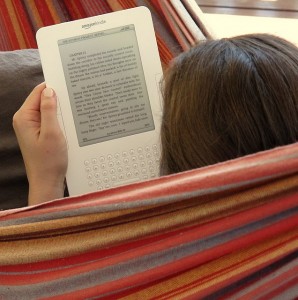 Last week Amazon launched a subscription service called Kindle Unlimited, immediately dubbed the “Netflix for ebooks” by just about everyone.
Last week Amazon launched a subscription service called Kindle Unlimited, immediately dubbed the “Netflix for ebooks” by just about everyone.
It costs $9.99 per month to subscribe, which works out to be $120 per year. For that reasonable price you get unlimited access to a library of over 600,000 books as well as around 2,000 audiobooks.
That was enough for one Forbes contributor to stop reading and immediately call for closing all libraries and buying everyone a subscription.
But with some of the highly-publicized battles between Amazon and publishers over ebook prices in recent years, one might look at $10/month for unlimited reading and think it’s too good to be true. How could Amazon possibly afford to do this?
Some have speculated that Amazon could be taking a loss to lock consumers in to its Kindle e-reading platform, or that they aim to crush ebook subscription competitors such as Oyster and Scribd before jacking up prices later.
But a crucial part of the answer emerges with a closer look at that library of 600,000 titles. Short answer: the good stuff isn’t there.
Multiple sources have reported that none of the Big Five publishers (HarperCollins, Macmillan, Penguin Random House, Simon and Schuster and Hachette) are participating in the program at all.
What you get instead are books that Amazon really wants you to read. According to industry newsletter Publishers Lunch, an overwhelming 500,000 of the included titles are self-published works from the Amazon Kindle Direct Publishing Program. Amazon’s own imprints are also featured heavily in Kindle Unlimited.
Then to attract attention it seems that Amazon has thrown in some big-name titles (ex. The Hunger Games). According to one author, they do not have publisher consent for these books, but Amazon “can do this with any title as long as they pay the publisher as if it were a ‘buy.'”
Additionally, Amazon utilizes sophisticated Kindle analytics and knows exactly how much we read, and Unlimited could potentially be very profitable if its subscribers do what nearly all of us do with electronic texts: click on a lot of stuff and skim. Currently, self-published author payments through Unlimited are made when a reader reads 10 percent of the book, not when it’s downloaded. So if a subscriber browses around for a while, downloads a few books, and reads the first few pages of each one over the next month, Amazon doesn’t pay out a cent in royalties. (It does appear that for now Amazon has agreed to pay other publishers by download, but this is still significant given that KDP Select and Amazon’s imprints make up the vast majority of included titles. It’s also no secret that Amazon is investing heavily into grabbing a bigger slice of the publishing market for itself.)
This is not intended to be a conspiracy post about evil Amazon planning to take over the world and enslave us all, however. There are some incredible possibilities for an e-book subscription service such as this. Having affordable access to a huge digital library on any device could make millions of people more efficient and prolific readers. And the unlimited model encourages exploration and browsing without additional cost. What’s more, the service could put even bigger pressure on major publishers to innovate and evolve as well, to the benefit of consumers and (hopefully) authors.
There are also some intriguing technical possibilities, such as the integration between ebooks and audiobooks with Whispersync for Voice, which allows readers to shift seamlessly from reading to listening as they go about their day.
Kindle Unlimited could be great, but it’s not even close to there yet. The biggest questions remaining are how that 600,000 book library will grow and whether it will include the titles that people actually want to read.
At this point it seems very doubtful that any of the Big Five will sign on, and if they somehow do, can the service possibly stay so affordable for the consumer?
That’s the risk with the unlimited leasing model: if it fails or becomes prohibitively expensive, you’re left with absolutely nothing. Now please excuse me while I crank some Spotify tunes and scroll through my Netflix queue to find something to watch.











Speak Your Mind